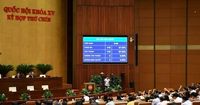On June 24, 2025, Vietnam's National Assembly unanimously passed significant amendments to the Law on Vietnamese Nationality, marking a pivotal shift in the country's approach to citizenship. With all 416 delegates voting in favor, the revised law aims to streamline naturalization procedures and bolster Vietnam's appeal to foreign investors, scientists, and experts, reflecting the government's commitment to attracting high-quality human resources for national development.
Deputy Chairman of the National Assembly, Nguyen Khac Dinh, presided over the session, setting the stage for a landmark decision that could reshape the demographic and economic landscape of Vietnam. Minister of Justice Nguyen Hai Ninh, who presented the report explaining and refining the draft law, emphasized broad support for the amendments during discussions both in committees and the plenary. “The policies in the draft law will create competitive advantages for Vietnam compared to other countries in attracting labor, especially high-quality labor,” he noted, underscoring the strategic intent behind these legal changes.
The existing Law on Nationality, prior to these amendments, imposed stringent conditions on applicants under Article 19. These included multiple strict requirements that often deterred potential candidates, particularly foreign experts and investors. Recognizing these barriers, the amended law revises Article 19 to relax conditions and facilitate easier naturalization for individuals with notable contributions to Vietnam’s construction and defense or those deemed beneficial to the Socialist Republic of Vietnam.
Specifically, the amendments exempt such individuals from several conditions outlined in points c, d, đ, and e of clause 1, Article 19 of the current law, aligning with provisions in Decree No. 16/2020/ND-CP. This exemption signals a clear governmental intent to attract and retain talent critical to Vietnam’s growth. Moreover, these individuals are allowed to retain their foreign citizenship, provided they meet two conditions similar to those applicable to Vietnamese citizens with relatives in the country and have the President's approval. This flexibility acknowledges the globalized nature of modern professionals and investors.
Another practical change allows applicants residing abroad to submit their naturalization applications at Vietnamese representative agencies overseas, simplifying the process for expatriates and foreign nationals alike. Additionally, the government plans to further develop a “special naturalization mechanism” as outlined in Resolution No. 57-NQ/TW, tailoring it to current realities through forthcoming decrees detailing the law’s implementation.
Beyond easing naturalization conditions, the amendments also clarify the relationship between the state and its citizens, especially concerning dual nationality. Article 5 has been significantly expanded, now including clauses 4 through 8, to regulate citizenship status in various contexts. Notably, clause 4 states that within Vietnam’s territory, the state recognizes dual nationality only in dealings with Vietnamese authorities, except where international treaties provide otherwise.
Crucially, clauses 5 and 6 impose nationality requirements on individuals holding key political or security roles. Those elected, appointed, or working in the Communist Party, state agencies, the Vietnam Fatherland Front, political-social organizations, sensitive agencies, or the armed forces must possess only Vietnamese nationality and reside in Vietnam. Similarly, civil servants and public employees generally must hold a single Vietnamese nationality unless exceptions exist that benefit the state without harming national interests, and they must reside domestically. These provisions aim to safeguard national sovereignty and ensure loyalty in sensitive positions.
Clause 7 addresses potential conflicts with other laws, stating that if earlier laws differ on nationality rules, this law prevails, while future laws with differing provisions require specific determinations on their implementation. Clause 8 further establishes that administrative decisions regarding Vietnamese nationality under this law cannot be subject to complaints or lawsuits, reinforcing the finality of such decisions.
The amendments also modify Article 13, adding clauses that protect the nationality status of Vietnamese people residing abroad who had not lost their citizenship before the law’s effective date. Those lacking official proof of nationality can now request confirmation from Vietnamese diplomatic missions abroad, with the government tasked to regulate the confirmation procedures. This move facilitates the maintenance of ties with the diaspora and ensures legal clarity for overseas Vietnamese.
One notable cultural and practical adjustment is the relaxation of the rigid requirement for naturalized citizens to have Vietnamese names. Responding to concerns raised by National Assembly delegates about international integration, the law now allows applicants who retain foreign citizenship to choose a combined Vietnamese and foreign name. This change, reflected in amendments to clauses 4 of Articles 19 and 23, eases the transition for naturalized citizens living and working in their countries of origin or other nations.
In response to calls for modernization, the draft law introduces provisions to incorporate digital technology into nationality procedures, as seen in the new Article 39 outlining government responsibilities. However, Minister Nguyen Hai Ninh pointed out the unique nature of nationality matters, which involve state sovereignty and potentially classified information, necessitating a cautious, phased approach to procedural simplification and digitization.
Accordingly, the government has amended several procedural regulations to improve efficiency, including clauses in Articles 20, 21, 24, 25, 29, and 41, and revised Article 13 to delegate nationality confirmation to Vietnamese representatives abroad rather than requiring them to issue passports directly. Passport issuance will follow the Law on Entry and Exit of Vietnamese Citizens. The government plans to continue exploring digital applications during the comprehensive revision of the law and the drafting of detailed implementation decrees.
These amendments collectively signal Vietnam’s strategic pivot towards openness and competitiveness in a globalized world. By easing naturalization for high-value individuals, clarifying dual nationality rules, accommodating cultural diversity in naming, and cautiously embracing digital technology, Vietnam aims to attract talent and investment vital for its ongoing development.
As Minister Nguyen Hai Ninh summarized, the law addresses existing obstacles in the nationality framework, fostering an environment conducive to the country’s growth and international integration. With these reforms now codified, Vietnam stands poised to welcome a new wave of contributors to its national progress, balancing sovereignty with openness in an increasingly interconnected era.

